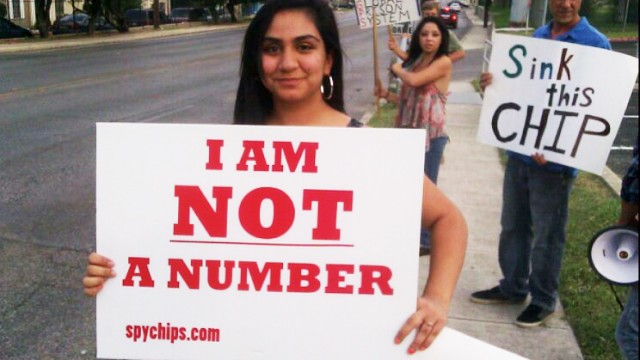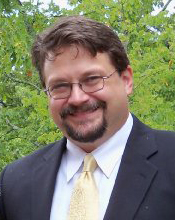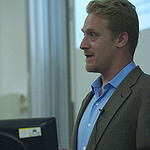
Through increasingly sophisticated surveillance technologies, corporations and the government track our everyday activities, often in the name of protecting Americans from terrorist attacks. Heidi Boghosian, a civil rights lawyer, told Bill Moyers this week that these two powerful forces are “hand-in-hand working to gather information about Americans as well as people across the globe.” But Boghosian says some people are refusing these intrusions into their privacy and coming out on top. Here are some of their stories.
Andrea Hernandez: Don’t track me
At the age of 15, Andrea Hernandez refused to wear a badge embedded with a radio frequency identification (RFID) chip to her high school, a magnet school for science and engineering. The ID card, issued by the Northside Independent School District in San Antonio, Texas, was given to students as part of the district’s project designed to better track attendance, which is linked to state funding. Hernandez said the ID card policy violated her civil rights on religious grounds. The district told her she could wear the badge without a chip, but when Hernandez refused on the grounds that her participation would make it appear that she endorsed the program, they ordered her to be transferred to a different high school. She was suspended in January 2013 and sued to stay at her magnet school, backed by lawyers provided by the Rutherford Institute, a nonprofit civil liberties organization. In August 2013, Hernandez, now a 16-year-old high school junior, was re-admitted to her former high school, in exchange for dropping her federal lawsuit against the school district. Northside has abandoned the RFID-monitoring program, saying it was ineffective.
Nicholas Merrill: Gagged for six years but silent no more
In 2004, Nicholas Merrill received a knock on his door from an FBI agent who carried a national security letter (NSL). The FBI was demanding that Merrill, who owned a small Internet service provider at the time, turn over information on one of his clients. They prohibited him from telling anyone that he had been approached by the government. Instead of complying, Merrill contacted the American Civil Liberties Union and filed a constitutional challenge to the NSL statute of the Patriot Act. The statute was ruled unconstitutional and Congress amended the law, allowing recipients to challenge requests for records and the gag orders that accompany NSLs. Merrill has since founded the Calyx Institute, a nonprofit dedicated to developing privacy technology to promote free speech and privacy on the Internet and in the mobile telecommunications industry.
Mike Webb: Keep your scanners away from my child
 When Mike Webb learned about a program at his son’s elementary school to scan children’s palms as part of their lunch program, he refused to allow his seven-year-old son to participate saying the system intruded on children’s rights. The biometric palm-reader program at Carroll County in Maryland had children expose their palms to vein-scanning identification devices in order to purchase food. Palm readers take infrared pictures of veins in the palm and match the image with stored information about children’s lunch accounts. Officials claim the scan program was intended to shorten cafeteria lunch lines, control inventory and create a more efficient accounting system. Webb reached out to The Rutherford Institute, who sent a letter objecting to biometric palm scanning. In late 2012, the Carroll County superintendent of schools announced that the district would cancel installation of the biometric equipment in schools that didn’t yet have it installed. It has since removed the biometric palm readers in all the schools.
When Mike Webb learned about a program at his son’s elementary school to scan children’s palms as part of their lunch program, he refused to allow his seven-year-old son to participate saying the system intruded on children’s rights. The biometric palm-reader program at Carroll County in Maryland had children expose their palms to vein-scanning identification devices in order to purchase food. Palm readers take infrared pictures of veins in the palm and match the image with stored information about children’s lunch accounts. Officials claim the scan program was intended to shorten cafeteria lunch lines, control inventory and create a more efficient accounting system. Webb reached out to The Rutherford Institute, who sent a letter objecting to biometric palm scanning. In late 2012, the Carroll County superintendent of schools announced that the district would cancel installation of the biometric equipment in schools that didn’t yet have it installed. It has since removed the biometric palm readers in all the schools.
Time’s Up: Guilty by association?
Time’s Up, a New York City-based environmental organization, learned in late 2013 that the New York Police Department (NYPD) had opened an investigation in 2008 on its executive director Bill DiPaola and two former members of the group. The NYPD wrote in a secret report that they had suspected an associate of theirs, Dennis Christopher Burke, of bombing a Times Square military recruiting station in 2008. As The New York Times reported, the NYPD evidence “stood on the frailest of reeds” — and the case remains unsolved. When DiPaola was contacted by Times about the report he said: “I’ve tried so hard to stay positive, to stress that we’re running an environmental organization,” he said. “But the honest answer is that we know the police have spied on us for years.” Authorities engaged in covert spying on and infiltration of Time’s Up starting in 2004 and for years after. In response to police infiltration, the group posted photos in their organizing space of known undercover officers. In addition, Boghosian says, the group has been holding open community meetings to educate others about infiltrators, distributing posters depicting undercover agitators. The group plans to meet with City Council members in New York’s new mayoral administration.





